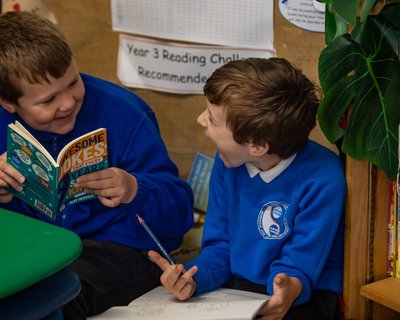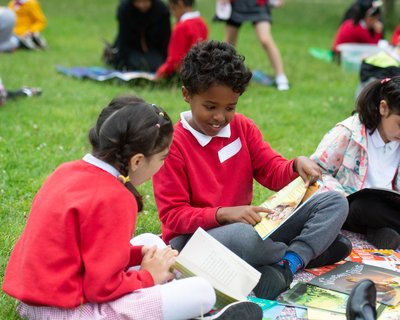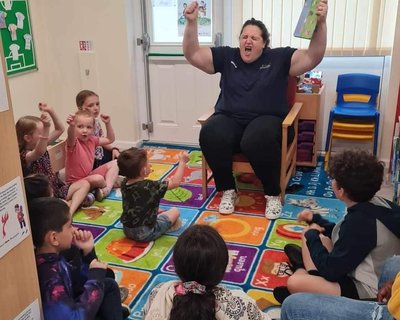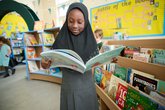Children and young people's reading for enjoyment is at an all-time low
Our latest research which explores children and young people’s reading for pleasure and daily reading habits in 2025, supported by Twinkl, reveals that the picture remains just as concerning a year on.
The report, taken from the results of 114,970 children and young people in the UK aged 5 to 18 who completed our annual literacy survey, shows a continued decline in children and young people’s reading enjoyment, albeit at a slightly slower pace than reported in our 2024 research.
- Only 1 in 3 (32.7%) children and young people aged 8 to 18 say they enjoy reading in their free time
- Only 1 in 5 (18.7%) say they read something daily in their free time
Both these statistics are their lowest levels in twenty years since we began tracking reading enjoyment and daily reading habits.
READ OUR 2025 RESEARCH REPORT IN FULL
New insights reveal reading motivations
However, despite a deeply concerning picture, new insights in the report show us what motivates children and young people to read and offers a window into what might re-engage those with the lowest levels of reading enjoyment.
What are some of the key motivators for children and young people to read in their free time?
While more girls read for wellbeing and emotional support, more boys leaned toward reading to connect with causes or the wider world. Reading to build knowledge and skills was equally strong across genders.
Children and young people who report low levels of reading enjoyment, though less engaged, still recognise reading’s educational value - nearly half said it helps them learn new words or new things.
How can we support children and young people to grow a love of reading?
The findings from our 2025 report suggest a need to align reading with children and young people’s personal interests and media habits in order to encourage a love of reading in their free time. Insights highlighted the following key motivators for those who took part in the survey:
More content
-
Books tied to films or TV series.
-
Books with visually appealing covers.
-
The freedom to choose what they could read.
-
Hearing recommendations from friends, family or teachers.
-
Encouraging reading through a variety of formats.
-
Consider using digital formats.
In fact, in 2025:
- Half (49.3%) of children and young people still read fiction or short stories in print each month.
- Two in five (40.1%) read non-fiction books, while
- comics and graphic novels (29.2%) and magazines (21.3%) also remain popular choices.
- Digital formats dominated in other categories, with song lyrics (60.7%) and news articles (28.2%) mostly read on screens.
These insights are powerful.
They suggest that re-engagement is possible, especially if we personalise reading opportunities around interests, allow autonomy in choice, and better link reading to other media children and young people already recognise as part of their cultural life.
If you're into it, read into it
We believe reading is a powerful plug-in to the things you already love – a great way to go deeper into your existing passions. We’re asking the nation to Go All in and see how reading in all its forms can unlock more of what you love.

Why is reading for pleasure important?
Our previous research shows reading for pleasure can support reading, and wider literacy, skills, wellbeing, empathy, confidence and aptitude for learning. In fact, our 2024 research showed that twice as many children and young people who enjoy reading in their free time had above average reading skills than children who don’t enjoy it (34.2% vs 15.7%).
Therefore, reading for pleasure is an important mechanism to encourage reading frequency which in turn is more likely to foster and improve a child's reading skills - something which is of fundamental importance at a time when children and young people’s reading skills are cause for concern, particularly for those from disadvantaged communities.
There are many benefits to nurturing a love of reading in a child's free time. It is a tangible way to equip children with the reading skills they need to thrive in school and beyond, as well as empower them with the chance to discover new things, both about the world around them and people and cultures they may not yet know and explore their sense of self.
Together, we can play our part to grow a generation of readers and make sure no child is left behind.
We're in this together
"This year’s data is once again stark. We are witnessing the lowest levels of reading enjoyment and daily reading in a generation – a critical challenge for literacy, wellbeing, and life chances. But our research also offers hope. Young people are still motivated to read when it connects to their interests, when they have choice, and when it feels relevant to their lives. We must meet young readers where they are – emotionally, culturally and digitally – if we are to reignite a love of reading across the UK.”
Jonathan Douglas CBE, Chief Executive of the National Literacy Trust

 Donate today and together, we can change a child's life story
Donate today and together, we can change a child's life story
The future of literacy: Multimodal reading
Download the first paper in our Future of Literacy series which explores how we must redefine what it means to be a reader in the digital, audio and visual age.

What are we doing to support children to discover a love of reading?
In July 2025, Secretary of State for Education, Bridget Phillipson, announced that 2026 will be The National Year of Reading. The National Year of Reading 2026 is a Department for Education initiative to address the steep decline in reading amongst children, young people and adults. The campaign is in collaboration with us, the National Literacy Trust, as the delivery partner.
Alongside our involvement in the National Year of Reading 2026 and over the next three years through our organisational strategy, we will continue in our commitment to directly support and empower 1.5 million more children and young people from disadvantaged communities to read for pleasure and develop greater confidence in their reading skills.
This includes ensuring every primary school has a dedicated library or reading space by 2028 through our Libraries for Primaries campaign and supporting young families with children aged 0 to 5 through Early Words Matter, which champions the crucial role of stories, songs and shared book experiences in building early language and emotional bonds that form the bedrock of future reading enjoyment and success.
We are calling for a joined up, multi-sector response from schools, libraries, other charities, businesses and government to amplifying our collective reach and influence, strengthening our impact and re-imagining solutions to this complex crisis. Through England’s ongoing Curriculum and Assessment Review, we are also calling for a culture of reading for pleasure to be embedded into all levels of the education system.
We continue to expand our current education programmes, offering high-quality reading for pleasure resources, and training opportunities for practitioners as well as increasing our community activities and family support around reading for pleasure.
-
Our mission is to ensure that every primary school in the UK has a library or dedicated library space to create a strong reading for pleasure culture in primary schools.Discover more about our campaign
-
With over a decade of experience working alongside schools and partners in Middlesbrough, we look at how our approach is transforming children's lives, and bucking the trend on national reading for pleasure statistics.Discover how our approach is working
-
Amid a national reading for pleasure crisis, listening to audio could provide a gateway into reading and reading enjoyment for many children and young people.Read our latest research on audio
How can you get involved?
Reading for pleasure in schools
We will continue to equip and empower practitioners to create a culture of reading for pleasure in your setting. Explore a range of high-quality resources linked to the national curriculum, expert-led CPD and training, and supporting blogs.

 Donate today and together, we can change a child's life story
Donate today and together, we can change a child's life story
#GrowAGenerationOfReaders
Add your voice to our social media campaign and join the conversation to make reading for pleasure a national priority.

 Donate today and together, we can grow a generation of readers
Donate today and together, we can grow a generation of readers
Reading for pleasure as a family
Explore ways you and your child can grow a love of reading at home, whether that is together as part of your daily routine or by supporting older children to disappear into a place of imagination and discovery.

 Donate today and together, we can reach more families with fun community activities
Donate today and together, we can reach more families with fun community activities
How can businesses support Reading for Pleasure?
We believe that cross-sector partnerships are a powerful way to amplify and further develop support for reading for pleasure in schools, homes and communities. Add you signature to our Vision for Literacy business pledge and be part of the solution.

 Donate today and together, we can equip more educators who will inspire children with a love of reading
Donate today and together, we can equip more educators who will inspire children with a love of reading
Become a Literacy Champion volunteer
Become a Literacy Champion volunteer in one of our communities and together with our local teams, come alongside parents, who may struggle themselves with low literacy levels, to build confidence and empower families through fun and accessible events and activities.

 Donate today and together, we can train more volunteers to support families and change a child's life story
Donate today and together, we can train more volunteers to support families and change a child's life story



